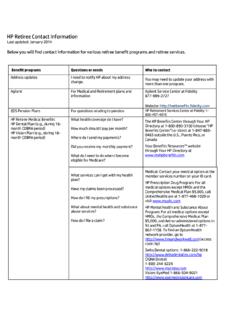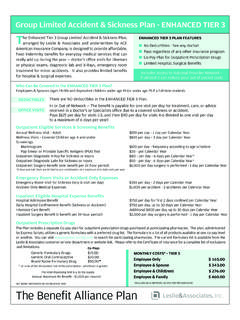Transcription of THE UNITED REPUBLIC OF TANZANIA MINISTRY OF HEALTH …
1 0 THE UNITED REPUBLIC OF TANZANIA MINISTRY OF HEALTH AND SOCIAL SERVICES REPORT ON MEDICINES coverage AND HEALTH INSURANCE PROGRAMS SURVEY IN TANZANIA 2008 1 Acknowledgements/Disclaimer This document has been produced with the financial assistance of the European Community, and with technical assistance from the World HEALTH Organization. The views expressed herein are those of the authors and can therefore in no way be taken to reflect the official opinion of the European Community or the World HEALTH Organization.
2 2 TABLE OF CONTENTS 6 8 Area of 9 Study 9 Sample and Sample 9 Data Collection 9 Data analysis 9 Insurance Program and 10 Description of Medicines 15 Access to Medicines Benefit .. 16 Medicine 17 Medicine benefit Review .. 18 Excluded medicines 19 Medicines inclusion 20 Restrictions on the Covered medicines .. 21 Cost 21 Perceived Problems with the Medicine 21 Availability of Data in HEALTH Insurance 22 Barriers in Data 25 Insurance program and 27 3 Medicines 27 Treatment 27 Medicines 28 Perceived 28 Data availability in the 29 Barriers in data 29 4 ACKNOWLEDGEMENTS Many African and transitional countries are currently establishing or expanding HEALTH insurance programs.
3 Many of these programs successfully collect revenues and enrol beneficiaries, but they struggle to devise optimal benefit packages and frequently provide inadequate medicines coverage . HEALTH insurance programs also have routine enrolment and claims data that enable them to monitor medicines utilization and cost, increase transparency, maintain efficiency, and design policies to increase quality of care and promote equity. They often however lack the capacity, tools, and networks to use existing data for evidence-based medicines policy decision making.
4 The collection of medicine insurance coverage of several African countries including TANZANIA was a pre-requisite to a training of policy makers, and analysts in HEALTH insurance programs as well as WHO Essential Medicines, National Professional Officers (NPO) in the different countries which took place in Ghana from the 16 to 25/11/08 to build their capacities in insurance information systems and how to generate evidence for medicines policy decision making. The MINISTRY of HEALTH and Social Welfare (MOHSW) therefore wishes to express its sincere gratitude to the European Union through which the World HEALTH Organization (WHO) was able to provide technical as well as financial support to enable the collection of the information in this report as well as the attendance of participants from TANZANIA to the Ghana meeting.
5 Sincere gratitude is given to Dr Z. Berege, the Director of Hospital Services, MOHSW, Mr Joseph Muhume the Assistant Director, Pharmaceutical Services, MOHSW and Mr E. D. Humba, the Director General of the TANZANIA HEALTH Insurance Fund for their leadership and support throughout the whole process. Ms Rose Marwa from the TANZANIA HEALTH Insurance Fund did a great job of collecting the required information and preparing this report. She also attended the workshop in Ghana. Special thanks are therefore accorded to her for the good work she did. Last but not least, the constructive contribution from Ms.
6 Rose Shija (NPO EDM/WHO TANZANIA ) for her helpful technical advice during the development of this document is hereby acknowledged. 5 EXCUTIVE SUMMARY This report describes a survey carried out in TANZANIA to collect information on medicines coverage and HEALTH insurance programs in the country. The information was collected using a pre- designed survey forms and through insurance programs documents. 60% of insurance schemes in TANZANIA are privately owned but covers only small proportion of the general population in the urban areas who can afford.
7 The National HEALTH Insurance Scheme for public servants covers more than 5% of the total population and its beneficiaries are equally distributed in urban, peri urban and rural areas. Major source of income for insurance programs in TANZANIA is members contributions. Insurance programs in TANZANIA have very comprehensive benefit packages whereby medicines are full covered in both inpatient and outpatient services. Medicines covered mostly have to be in generic and has to be approved by the TANZANIA Food and Drug Authority (TFDA).
8 40% of the Insurance programs have a written medicines formulary of which contains all medicines in the National Essential Medicine List (NEMLT) and few other more which are frequently prescribed especially in Referral Hospitals. Lack of regulatory marker authority in medicines and medical services prices is one of the threats facing insurance programs in TANZANIA . In conclusion, HEALTH Insurance is still a new concept in TANZANIA but much has been done with regards to medicines coverage to its beneficiaries. The major challenges facing the HEALTH insurance companies in the country are: Uncontrollable rise in medical expenses especially medicines due to lack of price regulatory authority in country for medical care; Increase cases of chronic illnesses like diabetes, heart diseases and cancer and fraudulent practices by HEALTH services providers.
9 Medicines are covered by insurance but medicines availability in the treatment facilities is another question which need to be addressed. Lastly Data keeping and proper utilization of the stored data for future development of the Insurance programs is something which needs to be strengthened in our HEALTH insurance programs 6 Introduction Background Thirty years after independence the government was the major provider of HEALTH services in TANZANIA . The government chose to be the sole provider of social services under the socialist ideology.
10 Following the Arusha Declaration (1967), private individuals and firms were restricted to own investments in production of goods or provision of services (Teskey and Hooper 1999). Private HEALTH services providers were actually banned in 1977 under the Private Hospitals (Regulation) Act. The practice of medicine as a commercial service was also prohibited under this act1. Tanzanian economy experienced a serious deterioration in 1970s and early 1980s. Before 1970, the rate of economic growth was at per cent but from the mid 1970s the rate decreased to per cent (Shitundu and Luvanda, 2000).















